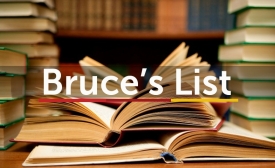democratic development

The new edition of Bruce's List features works from the U.S. Advisory Commission on Public Diplomacy, James Pamment, Condoleezza Rice, and more.
While the agenda for discussion was as academic: 'Actively shaping democracy – taking responsibility at home and abroad', the speakers, Merkel and Obama, were received as if they were rockstars. Obama may not be US president, but he can still pull in the crowds. This was Obama's first public appearance since he left office in January 2017, but the warm reception was quite reminiscent of the kind he would command as president. Germany loves Obama. It was hard to spot a single placard critical of him.
Stefano Manservisi, the EU's Director General for International Development Cooperation visited Somalia and signed a € 48 million new support package to strengthen governance, promote resilience and support vocational training. During his visit, Manservisi held talks with President Farmaajo and met with federal and regional leaders and confirmed the EU's commitment to supporting Somalia in consolidating achievements in security, governance, productive sectors and technical cooperation.
"Many bilateral aid programmes to Asia have been cut by over 40 per cent and there have been complete withdrawals from some sectors such as regional health programmes in South-East Asia. There has been a lack of strategic vision in Asia so clearly demonstrated by Australia’s reduction in assistance to Myanmar as a fledgling democracy and transitioning economy. We also remain extremely concerned that the most vulnerable people living on Pacific island nations are inadequately protected from climate change,” Purcell tells SciDev.Net.
During the 2016 election campaign, Trump declared that many of America’s foreign-policy problems began with the “dangerous idea that we could make Western democracies out of countries that had no experience or interest in becoming a Western democracy.” As on a number of other issues, the president-elect’s dramatic statement broke from not only establishment views within his own party, but the dominant perspective of America’s political and foreign-policy elites.
The 21st century, however, belongs to Football 3.0 (the Asian era). Over the last decade, football has been in the midst of a shift eastwards. Countries including Qatar and states of the United Arab Emirates have built extensive sponsorship portfolios in the West, acquired overseas clubs, and successfully bid to host international tournaments. More recently, China has increased the pace of world football’s ‘Asianisation’.







